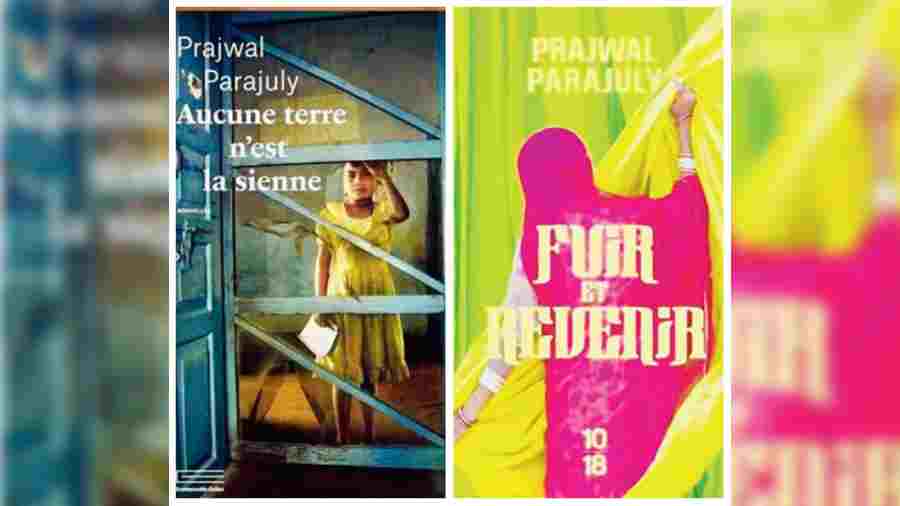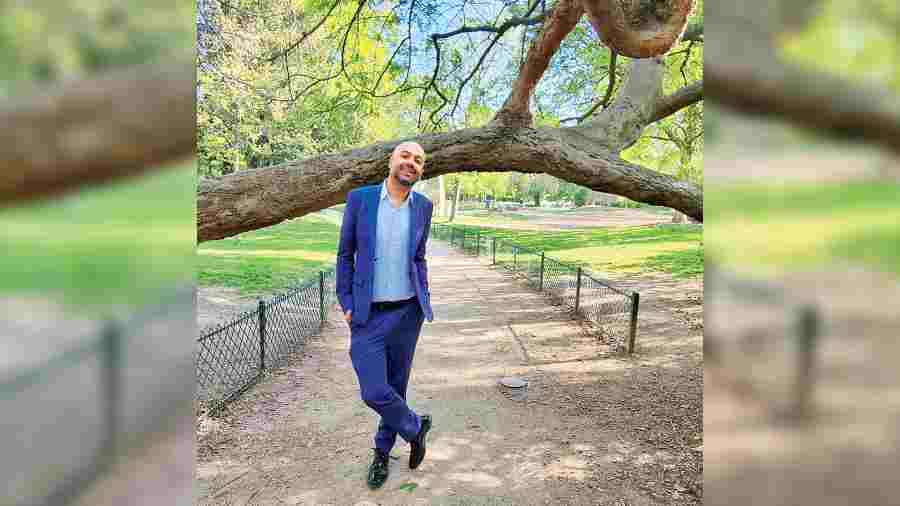Gangtok-born Indian writer Prajwal Parajuly, based in New York, has become an item in France’s publishing industry. Winning coveted French awards for writing about the Nepali-speaking diaspora, and blessed with a burgeoning readership, both fictional works by him are being published as French paperback editions in August and September this year. That’s a big deal for any writer.
Parajuly has turned out to be a phenomenon. As we spoke across the ponds, the cable crackled with excitement. Packing his bags in his apartment in New York, which has just been renovated, Parajuly is readying himself for a long French affair in a few days. With Land Where I Flee (2013) (Fuir et revenir) and The Gurkha’s Daughter (2012) (Aucune terre n’est la sienne) hitting the stands as French paperback editions — with Land Where I Flee being just released a few days ago on August 18, and The Gurkha’s Daughter to be released on September 9 — the 38-year-old author is delighted.
Parajuly confesses: “I am amused and grateful. Here I am clinging to the coat-tails of books I wrote so many years ago. Is a part of me smug that the books continue to be somewhat relevant? Yes. Is a part of me ashamed about still talking about these books? Absolutely!”
It is no surprise to see how popular his stories are. The Gurkha’s Daughter on the Calcutta University Master’s English syllabus for Indian Writing in English was a clear favourite with most of my class. His father is Indian Nepali and his mother Nepalese.
In his conversations with the MA students, Parajuly spoke passionately about the treatment of women, the abjectness of the marginalised, the challenges of being in a state of irredeemable poverty, about epistemic violence, nationhood, citizenship and being a minority in any nation.
His short stories Mixed Blessing, Let Sleeping Dogs Lie, No Land is her Land, are visceral and unabashedly revealing about the masculinist domination and bodily assault women in general and particularly from a minority community are forced to tolerate. In his first novel, Land Where I Flee, the dysfunctional members of a scattered diasporic Nepali-speaking family have a reunion with their 84-year-old grandmother.’

The French translations of Prajwal Parajuly’s books
This novel showcases Parajuly’s skill as a storyteller who captures the minutae of human character and makes his characters dance in front of his readers. In his interaction with the Nepali-speaking students in my class in particular, his stories resonated deeply. It is easy to see how Parajuly is passionate about teaching: every summer he has a hand-picked batch of students at the creative writing department of the Sciences Po International University, Le Havre campus, Paris.
Parajuly has been favoured by Lady Luck. This is not the first time that he has had the rare fortune to hit a home run and strike a first. In September 2011, Parajuly was applauded for being the youngest Indian author to be offered a two-book, multi-country deal. He was signed by Quercus. He published his first book in 2012, a short story collection with the title The Gurkha’s Daughter: Stories. Describing and dramatising the experiences of the Nepalese people and the Nepalese diaspora, his debut book was shortlisted for the 2013 Dylan Thomas Prize and longlisted for The Story Prize that same year.
Parajuly’s second book, the novel Land Where I Flee, came out in 2013. It was an Independent on Sunday book of the year and a Kansas City Star best book of 2015.
He was the first writer-in-residence at The Oxford Centre for Hindu Studies in 2013. In 2016, Prajwal Parajuly was invited to be a judge for the Dylan Thomas Prize. He was educated at Truman State University in Kirksville, Missouri, and the University of Oxford. Before committing to a writing career, he worked as an advertising executive at The Village Voice.
“I am an accidental writer. I didn’t write because there were stories in me bursting to come out. I wrote because I had just quit my job (at The Village Voice) and didn’t know what to do with my life. I don’t even enjoy writing as much as I used to. These days I call myself a former writer. That takes all the pressure off when inquiries about Book 3 don’t stop.”
Parajuly’s grit and guts to stay the course might have a lot to do with being a trekker. It probably courses through his veins — the call of the open road leading through the snowcapped troughs and peaks of Sikkim. He still makes time to trek. Some months ago in Greece, he would leave early in the morning and spend the day trekking through some rugged terrain. It was the same kind of persistence and relentless efforts to keep his books in peoples’ hearts that lit the spark in the minds of potential French readers.
Parajuly has a steely resolve, which is apparent in his investment in his own brand and he did not shy away from making the commitment to interact with French small-town book lovers who were interested in the Nepali-speaking diaspora, which is what he knows so well and writes about. Right through the worst months of the pandemic, in 2020, he was travelling to the far-flung interiors of France to interact with those who might have a desire to read his stories. And his efforts were targeted in the correct direction.
France is the only country where a chance meeting with a complete stranger can bring about a revelation, points out Parajuly. “You meet a person in a cafe or on the street and you respond to his questions about you by saying that you are a writer. He will take down the name of your book and your telephone number. Then he will go to an independent bookstore and buy your book, read it, and call you with questions. Can you imagine that happening in any other country? I can’t think of a better country in which to be a writer,” says Parajuly.
Parajuly’s literary agent Jerome Bouchaud points out: “Prajwal’s novel Land Where I Flee/Fuir et revenir came out in France at the worst possible time, in March 2020, when strong measures were being taken against the spread of the virus: large events got cancelled, including the Paris Book Fair to which Prajwal was invited, and bookstores remained closed for several months. Despite all this, Prajwal still came to France thanks to the support of his publisher and the French embassy in India, and he spent a few months on the road, taking part in small book events held in various parts of the country, or in online events.
At that time, he was probably the only foreign writer touring France. The response was extremely positive: French readers absolutely loved his novel, it was shortlisted for the prestigious Emile Guimet Prize and it went on to be picked up by a well-known paperback publisher. Two years on, the Paris Book Fair eventually took place in April and Prajwal was there, signing away copies of his book. The paperback edition has just been released on August 18, and his phenomenal collection of short stories The Gurkha’s Daughter / Aucune terre n’est la sienne will be released on September 9. The planets are perfectly aligned for Prajwal’s prolonged success with French readers.”
Parajuly concurs: “There had been so much excitement around the Land Where I Flee. India was to be the guest country at the Paris Book Fair in March 2020, and Fuir et revenir would be among the handful of books to be published to coincide with the festival. Emmanuelle Collas, my publisher, had left no stone unturned in ensuring the book’s visibility. Christine Cornet and the good people at the Institut Français and the French embassy in India had cobbled together teaching gigs and several appearances at other events after the festival. ‘Your book is getting a new life’, my literary agent often chimed.”
Prajwal Parajuly’s picture by Véronique Schauinget.
Julie Banerjee Mehta is an author of Dance of Life and co-author of Strongman: The Extraordinary Life of Hun Sen. She taught World Literature and Postcolonial Literature for many years at the University of Toronto. She currently lives in Kolkata and teaches English at Loreto College.
